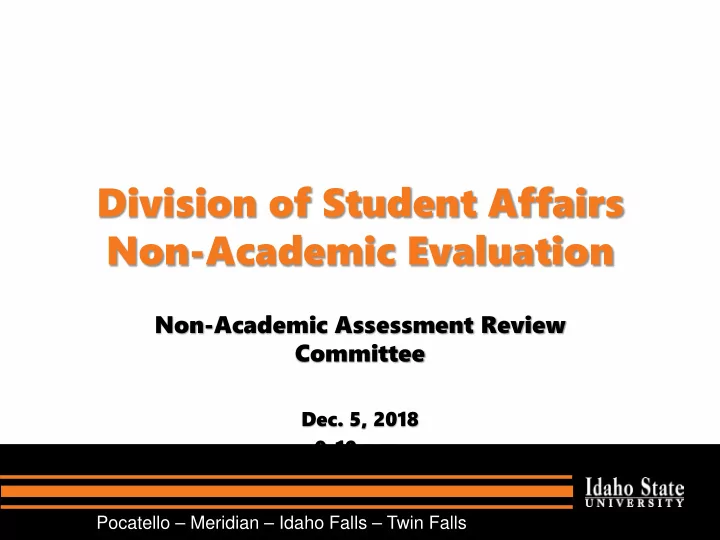

Division of Student Affairs Non-Academic Evaluation Non-Academic Assessment Review Committee Dec. 5, 2018 9-10 a.m. Pocatello – Meridian – Idaho Falls – Twin Falls
Agenda • Why Evaluate • Evaluation Process • Three Strengths • Three Recommendations • Conclusion Pocatello – Meridian – Idaho Falls – Twin Falls
Why Evaluate Non-Academic Orgs? • Why is it important to conduct a formal evaluation? Allows programs to highlight the engagement, support and opportunities they provide students Provides a clear picture of the organization by illuminating strengths and weaknesses Supports continuous organization and process improvement Required by our accreditor Pocatello – Meridian – Idaho Falls – Twin Falls
Evaluation Process • Three evaluators reviewed all of the submitted documents Ann Hackert- Special Assistant to AA: Program Review & Assessment Cody Fitch- AA Financial Analyst Darren Blagburn- IE Project Manager and Strategic Planner • For the review the team used CAS self-evaluation docs Student Affairs leadership documents, financial reports interviews Pocatello – Meridian – Idaho Falls – Twin Falls
Evaluation Process • Student Affairs chose to evaluate its subordinate units using the Council for the Advancement of Standards in Higher Education (CAS). • The Non-Academic Assessment Review Committee looked at the subordinate units’ trends to evaluate Student Affairs as a whole. • Referenced CAS & Northwest Commission on Colleges and Universities’ accreditation standards Pocatello – Meridian – Idaho Falls – Twin Falls
Evaluation Process • Reviewed the following CAS Areas 1- Mission 2- Program 3- Organization & Leadership (Strategic Planning) 9- Financial Resources 12- Assessment Pocatello – Meridian – Idaho Falls – Twin Falls
Three Strengths 1. The Division’s units have established an internal assessment committee to review its progress toward measuring mission fulfillment and student achievement and learning outcomes. Pocatello – Meridian – Idaho Falls – Twin Falls
Three Strengths 2. Most of the Division’s units have established mission statements and goals that support continuous improvement of existing organizational structures in place that assist in focusing resources allocation and support. Pocatello – Meridian – Idaho Falls – Twin Falls
Three Strengths 3. Student Affairs units are effectively doing more with less. The Division has effectively conducted its day- to-day operations as funding, which is directly tied to enrollment, has been reduced over the past three years. Pocatello – Meridian – Idaho Falls – Twin Falls
Three Recommendations 1. The evaluation committee recommends that the Division of Student Affairs update its strategic framework (vision, mission, and values), define mission fulfillment for the division, and create a new strategic plan. Pocatello – Meridian – Idaho Falls – Twin Falls
Three Recommendations 2. The evaluation committee recommends that SA create an assessment plan by first developing objectives that align with the mission and core themes. SA should develop and assess indicators measuring student learning outcomes and student achievement at the division and unit level. Pocatello – Meridian – Idaho Falls – Twin Falls
Three Recommendations 3. The evaluation committee recommends that SA develop a process and set of standards to collect evidence that more effectively supports unit evaluation. Data and evidence should be documented and reliable. Pocatello – Meridian – Idaho Falls – Twin Falls
Conclusions • Student Affairs did an exceptional job of creating their unit evaluations demonstrating their “Why.” • Next steps Use documents to support making changes in planning, organizational, and financial processes and incorporate assessment of student learning and achievement. Align priorities with the University’s strategic goals and core themes to attain mission fulfillment. Provide the NAARC an update 12/01/19 to demonstrate progress in areas identified as recommendations. Pocatello – Meridian – Idaho Falls – Twin Falls
Recommend
More recommend